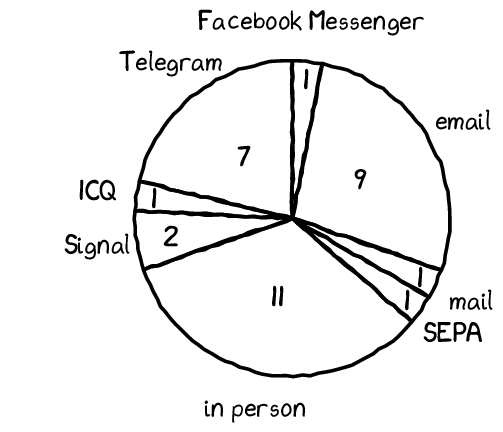Review:
What If?, by Randall Munroe
| Publisher: |
Houghton Mifflin Harcourt |
| Copyright: |
2014 |
| ISBN: |
0-544-27299-4 |
| Format: |
Hardcover |
| Pages: |
295 |
This is another one of those reviews that's somewhat pointless to write,
at least beyond telling people who for some strange reason aren't
xkcd readers that this is a thing that exists
in the world.
What If? is a collection of essays from that feature
on the xkcd web site and new essays in the same vein. (Over half are new
to this collection.) If you've read them, you know what to expect; if you
haven't, and have any liking at all for odd scientific facts or stick
figures, you're in for a treat.
So, short review: The subtitle is
Serious Scientific Answers to
Absurd Hypothetical Questions, and it's exactly what it says on the tin,
except that "serious" includes a healthy dose of trademark xkcd humor. Go
read
what-if.xkcd.com for numerous
samples of Munroe's essay style. If you like what you see, this is a
whole book of that: a nice, high-quality hardcover (at least the edition I
bought), featuring the same mix of text and cartoon commentary, and with
new (and in some cases somewhat longer) material. You probably now have
all the information necessary to make a purchasing decision.
If you need more motivation, particularly to buy a physical copy, the
inside of the dust jacket of the hardcover is a detailed, labeled map of
the world after a drain in the Marianas Trench has emptied most of the
oceans onto Mars. And the book inside the dust jacket is embossed with
what happens after the dinosaur on the cover is lowered into, or at least
towards, the Great Pit of Carkoon. This made me particularly happy, since
too often hardcovers inside the dust jacket look just like every other
hardcover except for the spine lettering. Very few of them have embossed
Star Wars references.
Personally, I think that's a great reason to buy the hardcover even if,
like me, you've been following
What If? on the web religiously
since it started. But of course the real draw is the new material.
There's enough of it that I won't try any sort of comprehensive list, but
rest assured that it's of equal or better quality than the web-published
essays we know and love. My favorite of the new pieces is the answer to
the question "what would happen if you made a periodic table out of
cube-shaped bricks, where each brick was made of the corresponding
element?" As with so many
What If? questions, it starts with
killing everyone in the vicinity, and then things get weird.
Another nice touch in this collection is what I'd call "rejected
questions": questions that people submitted but that didn't inspire an
essay. Most of these (I wish all) get a single cartoon of reaction to the
question itself, which include some of the funniest (and most touching)
panels in the book.
Ebook formatting has gotten much better, so there's some hope that at
least some platforms could do justice to this book with its embedded
cartoons. Putting the footnotes properly at the bottom of each page
(thank you!) might be a challenge, though. Writing mixed with art is one
of the things I think benefits greatly from a physical copy, and the
hardcover is a satisfying and beautiful artifact. (I see there's also an
audio book, but I'm sure how well that could work; so much of the joy of
What If? is the illustrations, and I'm dubious that one could
adequately describe them.) Prior web readers will be relieved to know
that the mouse-over text is preserved as italic captions under the
cartoons, although sadly most cartoons are missing captions. (As I
recall, that's also the case for the early web
What If? essays, but
later essays have mouse-over text for nearly every cartoon.)
Anyway, this is a thing that exists. If you follow xkcd, you probably
knew that already, given that the book was published last year and I only
now got around to reading it. (My current backlog is... impressive.) If
you were not previously aware of
What If? or of xkcd itself, now
you are, and I envy you the joy of discovery. A short bit of reading will
tell you for certain whether this is something you want to purchase. If
your relationship to physics is at all similar to mine, I suspect the
answer will be yes.
A small personal note: I just now realized how much the style of
What If? resembles the mixed text and illustrations of
One Two Three... Infinity. Given how
foundational that book was to my love of obscure physics facts, my love of
What If? is even less surprising.
Rating: 10 out of 10
 Randall Munroe recently mapped
Randall Munroe recently mapped 




 Panel 2:
Panel 2:
 (Background info for those who don't know CosmicRay
(Background info for those who don't know CosmicRay